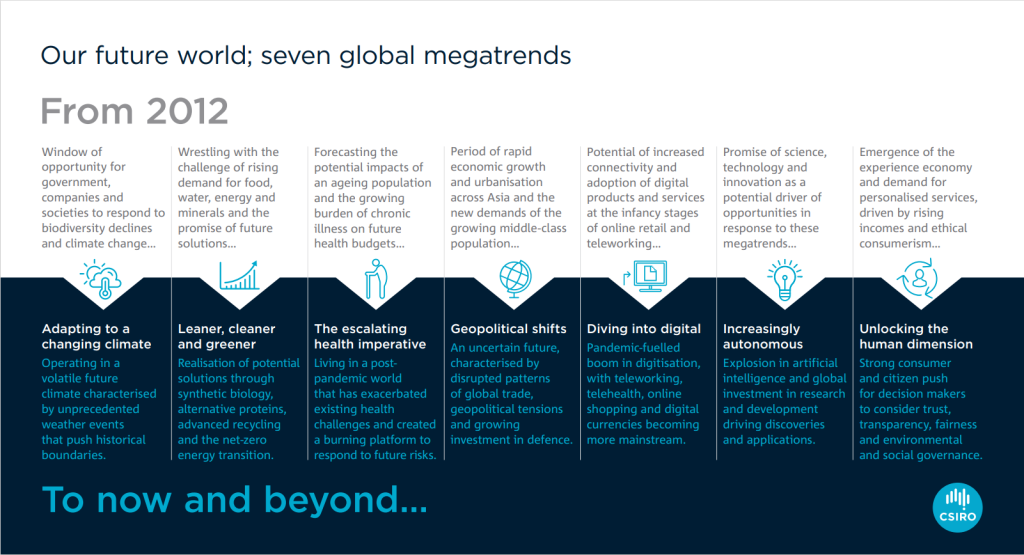The CSIRO has released a once-in-a-decade report identifying seven global ‘megatrends’ that are likely to impact Australia over the next 20 years.
Our Future World has an outlook to the year 2042, and revisits trends identified in the 2012 report of the same name. It examines geopolitical, economic, social, technological and environmental forces unfolding around the world, and their likely impact on Australian people, businesses and governments.
One of the seven megatrends is ‘Leaner, Cleaner and Greener’, predicting an increased focus on synthetic biology (which includes precision fermentation), alternative proteins, advanced recycling and the net-zero energy transition.
The report says that global food demand will increase by 35 to 56 percent between 2010 and 2050, a reduction from the Food and Agriculture Organisation’s prediction of a 70 percent increase. And while some 75 billion tonnes of fertile soil and 12 million hectares of productive farmland is lost to land degradation each year, the report says meeting the future demand for food is still feasible.

Alternative proteins will play a key role in satisfying the growing global demand for protein, the report says.
“Alternative proteins are expected to represent 11 to 22 percent of the world’s protein market by 2035, and sales of plant-based meats could reach $3 billion in Australia by 2030,” it reads.
When it comes to synthetic biology technologies, which include precision fermentation (embraced by alternative protein companies including All G, Change Foods and Eden Brew), the report says Australians need to be educated on what the technology is and the opportunity it represents.

“As synthetic biology applications expand, it will be more important to manage any potential concerns around the ethics or safety of these technologies. Most Australians have limited knowledge around synthetic biology (85 percent) and they are more likely to support applications that have clear public health or environmental benefits,” it reads.
Synthetic biology is a field of science that involves redesigning organisms for useful purposes by engineering them to have new abilities. In the case of precision fermentation, microbial hosts are used as ‘cell factories’ for producing specific functional ingredients, including protein.
The CSIRO established the Future Protein Mission to help create high-value protein industries, and its leader, Professor Michelle Colgrave, said science and technology will allow Australia to capitalise on the opportunity that alt proteins represents.
“The megatrend ‘Leaner, cleaner an greener’ identified that as the size of the global population continues to grow and as more people transition from lower to higher income brackets, there will be escalating pressures placed on finite food, water, mineral and energy resources,” Colgrave told Future Alternative. “This is driving a new way of thinking and doing things, driven by science and technology, including needing varied and complementary protein sources to meet demand.
“Our National Protein Roadmap released earlier this year identified that as much as 22 percent of the world’s protein needs could be met by alternative sources by 2035. CSIRO’s Future Protein Mission is seeking to seize the opportunity created by the world’s growing demand for high quality protein by supporting new Australian industries through science, innovation and technology.”
A snapshot of the megatrends:
- Adapting to climate change: with natural disasters expected to cost the Australian economy almost three times more in 2050 than in 2017, we can expect to be living in a more volatile climate, characterised by unprecedented weather events.
- Leaner, cleaner and greener: an increased focus on potential solutions to our resource constraints through synthetic biology, alternative proteins, advanced recycling and the net-zero energy transition. By 2025, renewables are expected to surpass coal as the primary energy source.
- The escalating health imperative: the post-pandemic world has exacerbated existing health challenges posed by an ageing population and growing burden of chronic disease. One in five Australians report high or very high levels of psychological distress and there is heightened risk of infectious diseases and pathogens resistant to modern antibiotics. There is now a burning platform to also respond to our health risks and improve health outcomes.
- Geopolitical shifts: an uncertain future, characterised by disrupted patterns of global trade, geopolitical tensions and growing investment in defence. While the global economy shrunk by 3.2 percent in 2020, global military spend reached an all-time high of $2.9 trillion and Australia saw a 13 percent increase in cybercrime reported relative to the previous year.
- Diving into digital: the pandemic-fuelled a boom in digitisation, with teleworking, telehealth, online shopping and digital currencies becoming mainstream. Forty percent of Australians now work remotely on a regular basis and the future demand for digital workers expected to increase by 79 percent from 2020 to 2025.
- Increasing autonomous: there has been an explosion in artificial intelligence (AI) discoveries and applications across practically all industry sectors over the past several years. Within the science domain the use of AI is rising with the number of peer-reviewed AI publications increasing nearly 12 times from 2000 to 2019.
- Unlocking the human dimension: a strong consumer and citizen push for decision makers to consider trust, transparency, fairness and environmental and social governance. While Australia saw a record level increase in public trust in institutions during the pandemic, this ‘trust bubble’ has since burst, with societal trust in business dropping by 7.9 percent and trust in government declining by 14.8 percent from 2020-21.
To stay up-to-date on the latest industry headlines, sign up to Future Alternative’s enewsletter.
Posted on:


